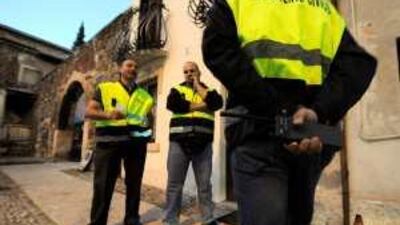BERLIN // The mayor of a small town in northern Italy has caused outrage across Europe by launching a campaign called "White Christmas" to evict illegal immigrants by December 25, Christmas Day. Franco Claretti, the mayor of Coccaglio, near Milan, has instructed the local police force to visit all immigrants whose residence permits have expired or are close to running out. His order went out on October 25 but has only recently been picked up in the Italian media, and has provoked accusations of racism.
"We want to clean up," said Mr Claretti, a member of Northern League, an anti-immigrant party that is part of the ruling coalition of the prime minister, Silvio Berlusconi. The town's councillor in charge of security, Claudio Abiendi, said: "For me Christmas isn't the festival of hospitality, but of Christian tradition, of our identity." The number of immigrants living in Coccaglio has increased almost tenfold since 1998 and now totals 1,600, less than one-fifth of the population of 7,000. The measure affects 400 immigrants, most of whom are from Morocco, Albania and the former Yugoslavia.
The Northern League leader, Umberto Bossi, who is on record describing African immigrants as "bingo bongos", said: "Immigrants must be sent home. We don't even have enough work for us." Those found with residence permits that expired six months ago or earlier will be expelled if they cannot prove that they have tried to renew them. Mr Claretti said other local authorities in Italy were also checking immigrants whose residence permits have expired, and that the only difference was that Coccaglio was sending the police round rather than despatching letters.
Kurosh Danes, the immigration spokesman for Italy's biggest trade union, the CGIL, condemned the measure as racist and "fascist". "It reminds me of the echoing boots of fascist soldiers in the ghetto of Rome while they were hunting Jewish citizens," Mr Danes said in a statement. Anna Finocchiaro, floor leader of the opposition liberal Democratic Party in the Senate, the upper house of parliament, said: "The Northern League has a xenophobic, racist, violent and backward-facing view of our country."
The Northern League, junior partner in Mr Berlusconi's coalition, is a separatist party that would like to declare Italy's rich north a sovereign republic independent from Rome. Most of its supporters are concentrated in the industrial north of the country. It won 8.3-per-cent support in the 2008 general election. The economic downturn and concerns about immigration gave the party a further boost this year, enabling it to win 10.2 per cent in European parliamentary elections in June.
Several other towns in northern Italy have taken similarly controversial steps to discourage illegal immigrants. The mayor of the town of San Martino dall'Argine has launched a neighbourhood watch campaign urging citizens to report suspected illegal immigrants to the police. At least two other towns have started similar schemes in line with a call from the Northern League to crack down on foreigners.
The move follows a controversial tightening of Italy's immigration laws this year in response to a surge in illegal immigration in recent years, much of it by sea from Africa. Under the new measures, residence permits for people from outside the European Union will be linked to employment and will be limited to one year. People who lose their jobs will have no chance of having their residence prolonged and will be classified as "illegal" once their permits run out.
The law includes procedures for medical staff to denounce illegal immigrants, makes illegal immigration a criminal offence punishable by a fine of ?5,000 to ?10,000 (Dh28,000 to 55,000) and sets prison terms of up to four years for those who defy expulsion orders. It also allows the creation of unarmed citizen patrols to help police and soldiers fight crime on the streets, and makes it an offence to force children to beg, a measure viewed as targeting Roma people.
The number of illegal immigrants from the coast of Africa intercepted along the southern Italian coast dropped slightly to about 20,000 in 2007, but landings doubled in 2008 and kept on rising in early 2009, according to the Organisation for Economic Co-operation and Development. dcrossland@thenational.ae

Outcry over Italy's 'white Christmas' plan
Officials target illegal immigrants and town's mayor sends police to check residence papers and evict overstayers by December 25.
Most popular today
